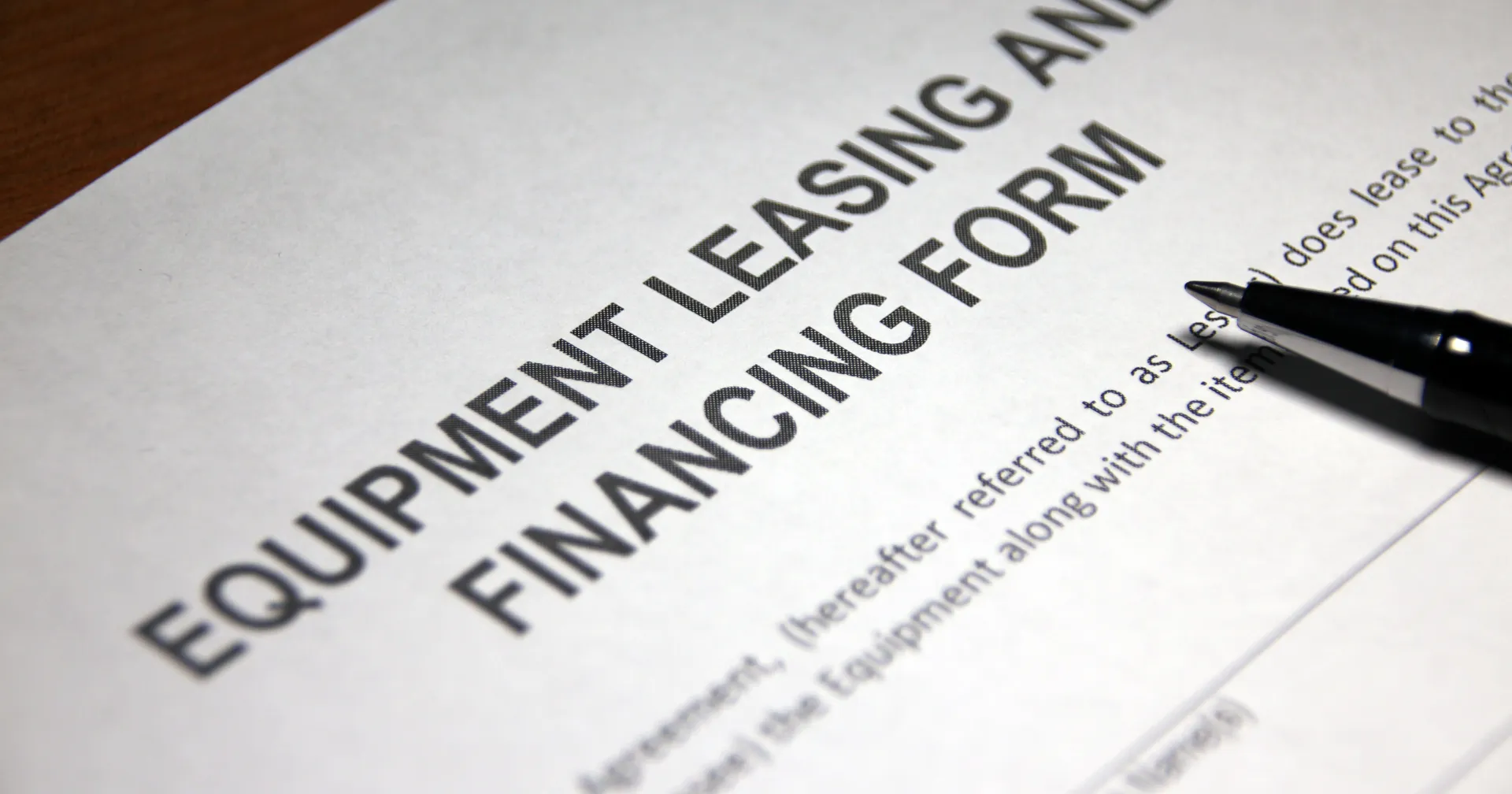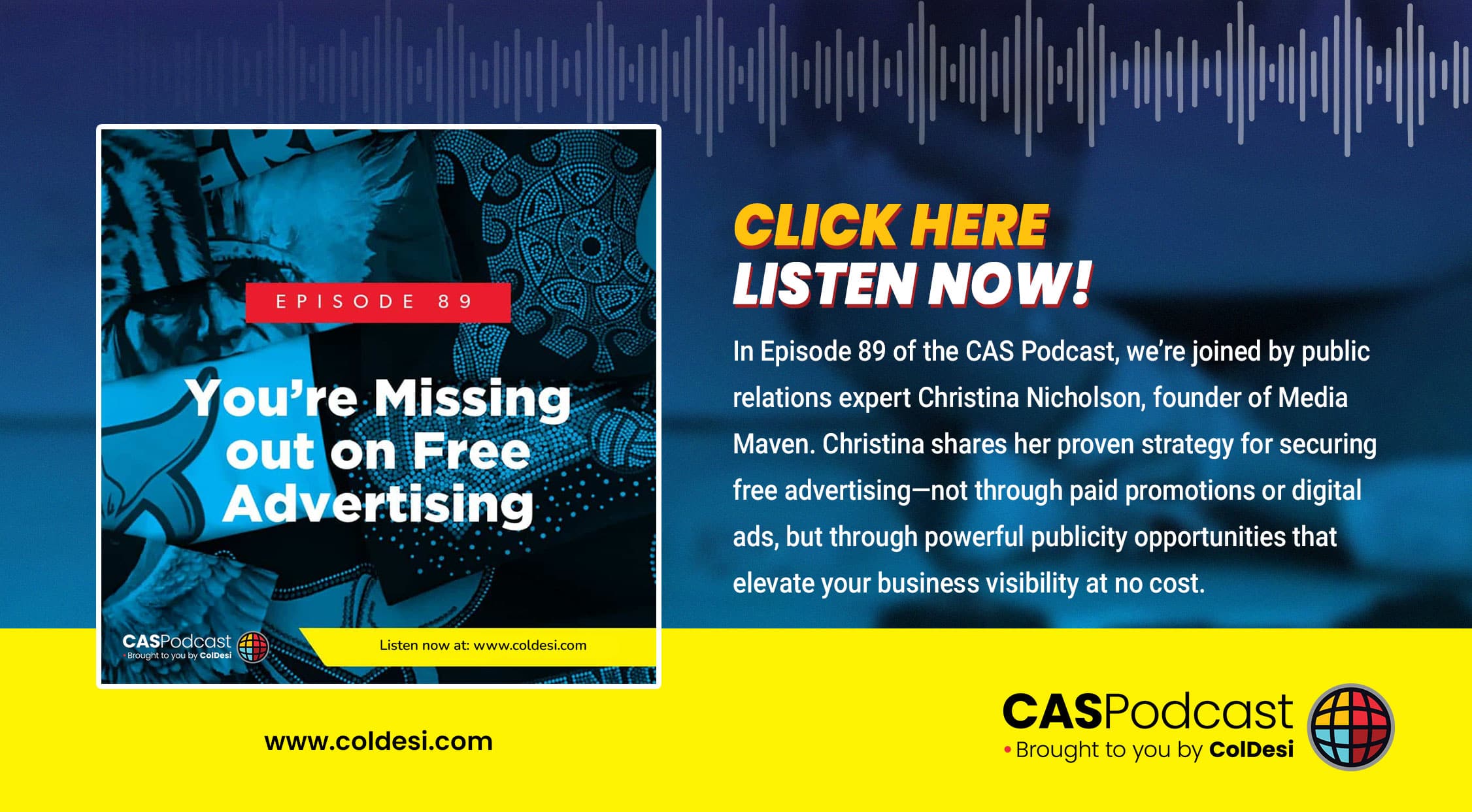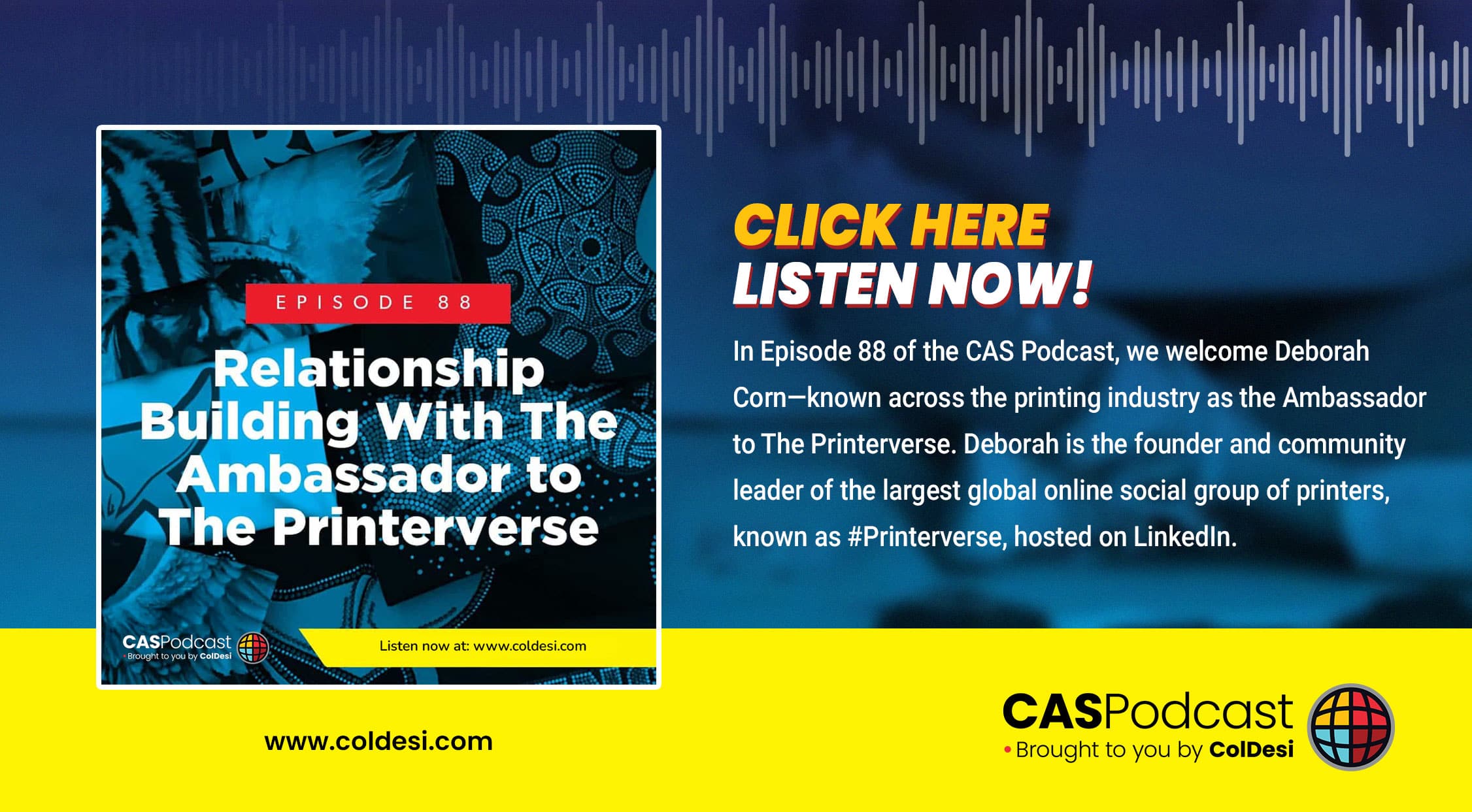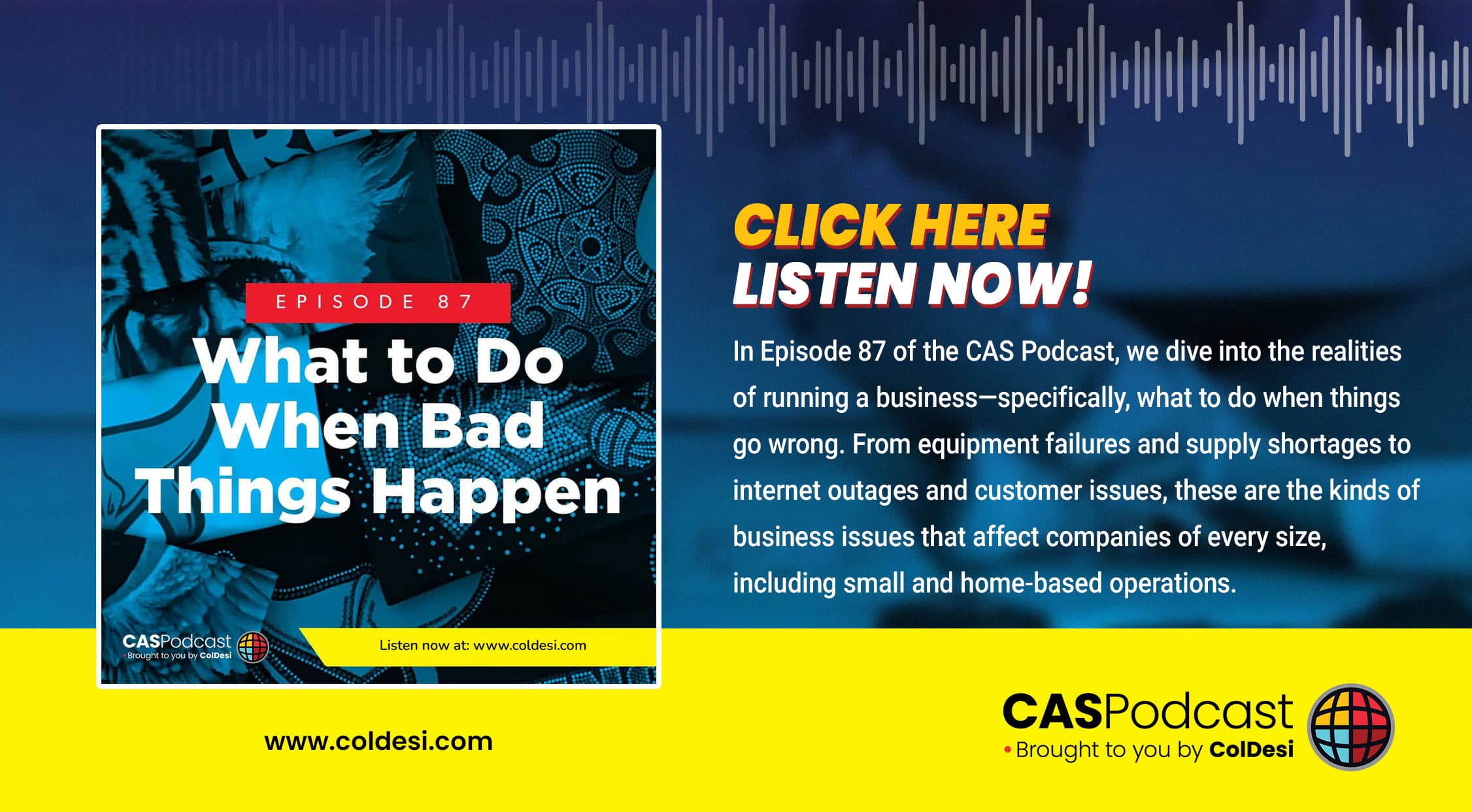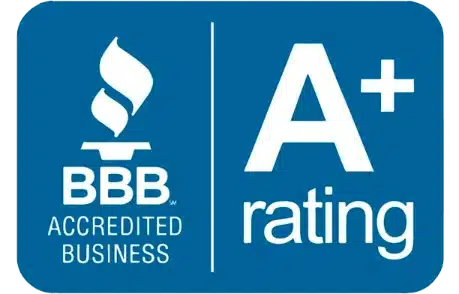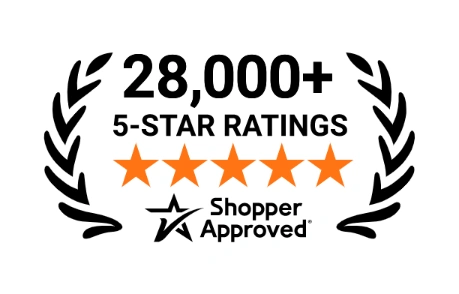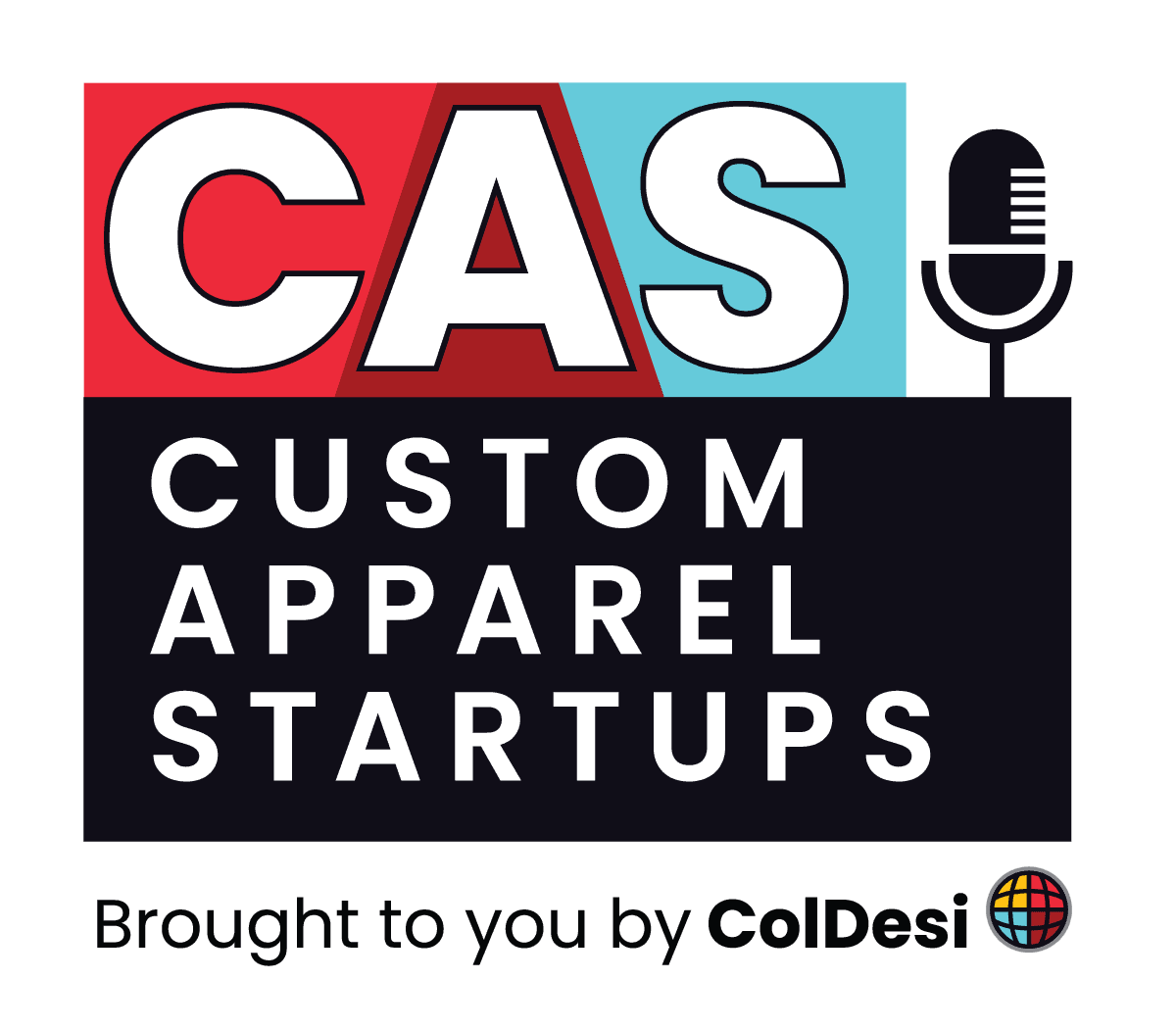
Episode 45 – Equipment Leasing with John Sullivant
We spoke with John Sullivant about leasing equipment. Why you should or shouldn’t and what the benefit are as opposed to buying the equipment outright. It’s such a common question from our customers.
I work with Adia Capital, a financial partner of ColDesi. I actually started out as a screen printer about 30 years ago. Learned a lot about the industry through trade shows and magazines which lead to a job with a popular magazine. When I left that I went into the embroidery business, for about 5 years. I sold that business and got into the leasing side. I’ve been on the finance side for about 19 years now.
You’re a guy that actually understands the business and the equipment that people are talking about and trying to finance. As well as being able to handle the money side. As we talk to people on this podcast you find there’s a lot of people with experience across the board, because there are so many facets of this industry.
So often when I’m dealing with startups I can help them not only with finance, but understanding the market and how to do a little bit of market research. What the market will bear, what kind of overhead to expect, which in turn will let them set a margin that will help them stay in business.
One of the things we picked up from our last conversation is ColDesi customers lease a significant portion of their equipment. Is that something you see across the industry John?
Absolutely. And it’s been that way for quite a while now. I think the reason is we’ve done a really good job of educating the vendor and the customer on some of the benefits of leasing. And I think ultimately people find a partner more than just a bank. They find someone that they can grow their business with that only lends money on equipment so they can protect their bank lines and their different local area lenders, so if they need cash flow for different areas of their business that bank will be there for them.
So when someone leases equipment from you, that’s not really part of their other business relationship with their bank. If someone wants to get a multi-head embroidery machine and they set up a lease with your company, that’s not going to affect their line of credit with their bank.
That’s an amazing benefit of leasing, we don’t report to the credit bureaus. So truly no one is going to know that they don’t own the machine unless they tell them. For example when you borrow money from us for your equipment, depending on the type of lease we do, a lot of it can be off balance sheet for your business. So you don’t have to carry the debt on your balance sheet. That’s a big benefit because you can actually show your profitability, but you don’t have to show the debt of a liability.
For some of our customers who might not be as sophisticated with business and don’t know what a balance sheet is, those are typically the things for business that you have to provide to a bank if you’re going for a loan. You have to say “Here’s all the equipment that I own. Here’s the debt attached. Here’s how much I’m making.”
A lot of startup businesses aren’t going to be thinking about that, and rightly so in some instance. But it is one of the benefits of being able to borrow money from someone who’s not taxing your personal credit or affecting your balance sheet. That’s an important thing to know for any one who’s starting a business. That’s why we do some many deals in our industry, because people eventually find that out after talking to a leasing agent or vendor. A lot of the sales reps that work for ColDesi are very versed in this and they give that information to their customers, and then we can confirm that information and that lets them purchase equipment while best protecting their financial investment.
Flexibility is the number one reason for small businesses to use leasing. Flexibility meaning that no one has a cyrstal ball, no one knows what’s coming down the road. You don’t know if you’re going to need to borrow money from your bank for a large order, you don’t know if you’re going to need to borrow money for other reasons that come up. Two of the main things that really affect small businesses when they need a bank line are marketing and in some cases taxes. If you use up your bank line on equipment, then that ability to borrow is gone. So it’s important to use lease financing in that regard.
When I used to sell equipment I would have folks who were debating what they were going to do. “I’ve got some cash. I’ve got these two credit cards with 0% interest for the first year. I’m considering financing.” I would tell them that all that’s great but you need to talk to the leasing company first, because you have to consider that you’ve got this credit card that’s at 0%, which is great, however that’s money that you can access instantly at any time. You want to consider, do you want to take this $15,000 that you’ve got available and use 90% of it in a revolving debt? Is that the best financial decision? It may be for some people, but often times if you can lease it I would tell people, let your equipment finance person handle that. Take that money that’s available now and save that for when you need it tomorrow.
One of the things we talk about in blog posts and in podcasts is that cash is hard to come by. If you have $10,000, or saved up $25,000 to start a business, then it’s going to be a while before you can build that safety net back up. That big order can be a business killer if you’re not prepared for it. You get that order from a university or big business that wants 500 shirts. You’re going to have to buy those shirts or whatever they are. You’re going to have to spend the labor to get those shirts made. You’re going to need the supplies. You’ll want to get a percentage extra in case some in the order are wrong. All that time passes and then you’re going to send these big companies an invoice and they’re going to pay you when they like. So that second big order you get, you might not be able to fill. Perhaps that company doesn’t pay you for 60 or 90 days, and you don’t have the cash.
That’s a very important statement. Going back to what Mark Vila said about revolving debt, he’s absolutely right. One of the big killers is revolving debt. It will plummet your score. One of the main things to protect as an entrepreneur is your credit. When you create that revolving debt to buy your equipment, you might be getting 0% interest, but it’s taxing your ability to borrow. You don’t know what’s coming down the road, so it’s important to keep those lines over. Never create revolving debt as an entrepreneur if you can help it. Real estate debt is something they can live with, revolving debt is a real killer for your credit. Going into the cash side, cash is king. I can make a case for leasing: if you have ton of money, if I was looking at this objectively as a business owner, I would never spend my cash. Just based on the principle of the time value of money. It’s a principle that basically says that your money is worth more in your pocket today than it will be tomorrow. Keep your money, keep it working for you. Even if you simply have a large amount and you’re drawing interest from the bank and you’re drawing small amounts out. You still have that cash which makes you more viable for a bank and it’s also earning money.
Let’s look at it from a perspective of a consumer rather than the business owner. I’ve talked to a lot of businesses that have always paid cash for them, they’ve always been debt free, and it’s important to them that they’re debt free. While I totally agree with that on the consumer side, I do not agree with that on the commercial side. So if I’m buying a car I want to pay cash, or finance for super low interest on a short-term, because there’s no benefit to it. It’s simply getting me from point A to point B and deprecating very rapidly. As a business, if you have cash, keep that cash working for you. Here’s why, when you do a lease you’re able to write off 100% of it in your taxes anyways. It doesn’t make sense to spend your cash, when you can use someone else’s cash and have a monthly payment that’s very affordable and in most cases lower than what most banks will provide, and do it in a way that protects your credit, allows you to keep your cash and gets you the equipment that you and your business needs.
“But I don’t want to pay interest on equipment if I can just pay for it in cash.”
I’m 51 and I’ve lived a life of not financing personal things in most cases. My grandfather taught me that when I was young. We run into that. Debt is bad, you don’t want debt. And I totally agree. Look at the reset our country had in 2008, a lot of that had to do with debt. But in business, the offset is that you’re able to write it off. If you couldn’t do that then it wouldn’t make a lot of sense. But because of the tax write-off benefit it does make sense to use someone else’s cash. The people that are “no-debters”, I love talking with them and strategizing with them, and sometimes debating with them. They see it from one angle and I’m trying to get them to see it from the other because most times that point of view and that mandate in their life is a personal decision. It’s not a business decision. So when you bring it into the commercial aspect it does open the door to look at financing in a way that you never did as a consumer.
As long as someone doesn’t overreach – this is important to know, because finance companies will allow you to overreach, they’ll lend you the money. You’re the one that has to do the homework and make sure that you have a viable business plan and that you’ve done your market research. That you know what the market will bear. That you know what type of margins you can charge. And that you’re not over over-heading your business. So many people in this business when they go into it have this idea of a boutique in this nice retail area. While those businesses exist and most of them thrive, they didn’t start there. It’s knowing your starting point and where you can grow in order to be able to afford those types of retail locations.
You’ve talked about the tax advantages of leasing, and being able to write stuff off. A lot of our customers who have never been in business themselves, really don’t have an idea of what that means.
Most small businesses don’t realize this but the two major culprits that get businesses are tax expenses – sales and income tax – and also marketing. If they’ve never opened or owned a business they don’t understand how much it does cost to market and how many pennies of your $1 you get to keep. The answer to those questions is vital to those people in business. Let’s say you’ve always worked for someone, you’ve always been on a W2, you’ve never had to pay your own taxes. When you open your own business, you’re the one paying the taxes. People need to realize that every dollar they make they’re very lucky to be able to keep 75% of it. In most cases it’s less than that. Also, if you own your own business, the real high percentage part of your taxes is your self employment tax. It’s very important to consult your accountant or CPA because there are variables that go into these statements that they’re going to be able to answer a lot better than I can.
It’s important to know: when you make money, you owe money. When you finance your equipment through lease it allows you to write off 100% of what you’ve paid in. So let’s say you have a bank loan, you’d be able to depreciate the equipment – the expense, the interest, and any other other expenses such as maintenance – you can expense those things. Now, with lease, depending on what kind of lease you do, you can write off 100% as an operating expense. Let’s say you have an operating lease that carries a purchase option of 10% or greater. Then you can write off 100% without depreciation. You can simply expense it.
So many times when it comes to taxes, is it a dollar for dollar write off? If I spend $10,000 and I owe $10,000 to the IRS, do I owe $0 now? The answer’s no. It’s depending on your tax bracket and whatever money you put it, or you paid in on the equipment you can head to the 100% of the percentage of tax you pay. A lot of people are talking about this at this time of year, Section 179.
What’s Section 179? The truth is all it is, is an acceleration of depreciation into one year. So let’s say that most people when they finance something they’ll depreciate it if it’s a depreciate-able loan or lease over the term (1-5 years), and at the end of that time it’s depreciated out. The IRS has allowed us to have this Section 179, that allows us to write off 100% in one year. So let’s say you’re a startup business and you spent $20,000 on your equipment, Section 179 probably isn’t something you should be concerned about, because you’ve not generated enough income most likely in that first year to have to have a depreciation scheduled into one year. But let’s say that second or third year down the road, you’re making a lot more money, which means you’re going to owe a lot more money. Then Section 179 becomes very important because as you pay your taxes as a business, you may see that you’ve been paying the lease off for two years, and if you paid off the remainder you could write it off against your taxes. You don’t have to do it right when you buy, you can do it whenever you want to as long as there’s some time remaining in your schedule. Sometimes it’ll allow people to get out of a pretty heavy tax burden for that year. Going forward the thing to remember is that there’s no more depreciation for that.
When you talk to a good rep at any company when you’re buying equipment, you’ve got to work with people who know what they’re talking about. And can fill in those holes for you. If you’re already in business, and have been for a couple of years, and you want to look at adding equipment, or if you’re just starting, you have the opportunity to work with someone who has your best interest at heart. When you talk to a good leasing company or financing company they key is that you’re getting the right advice that will benefit your business. When you buy something from Coldesi, we do things, like these blog posts, to help you be successful, because we sell other stuff. We want you to grow and buy a DTG printer or a rhinestone machine. John’s kind of in the same boat. He wants to give you the right fiance deal on whatever you’re looking at because he knows that if you do that right and he can answer the questions for you, that you’ll be back to lease more equipment.
If you pay cash for your equipment right now, when you go to do your taxes, the government’s going to want to take certain amount from you. You have a brand new business and you basically earned nothing. They’re going to want to take basically nothing from you. However in three years time, or twelve months, whatever it might be you’re going to earn money and it might be enough where the government wants to take a nice chunk. Having the Section 179 and the lease gives you the opportunity to say, “hey you know what government, I’m going to put a block card on those taxes, because I don’t want to pay that today.” I’m going to go ahead and use this money that I invested in equipment as a business expense, and I can use all of that right now, or I can continue to use pieces of it over time.
Also the value of that equipment with wear and tear and age, will change over time and the government says you’re allowed to reduce the amount of taxes you pay based on some of that as well.
It’s so difficult to read about something like this – you get so much information and you think you understand it – then it comes time to pull the trigger and you go, well I’ve got to have that right. Here’s what’s important to know. When you talk to your sales rep, they’re going to point you in the right direction they’re going to do everything they can to help your business succeed. They’re not just there to sell you equipment, they’re there to help you with your business. The same thing holds true for Adia Capital. If some of the things we’ve said are hard to understand or you don’t feel like they’re pertinent to you, we can assure you they will be. Contact us. You don’t have to call us and fill out an application to be able to talk to use and brainstorm with us about your business. That way you can determine whether or not lease finance is something you want to do.
What kind of credit do you actually need to lease equipment?
That’s an important question. Really that doesn’t matter right now. Call us and talk to us about your credit. If you know that you have poor credit call us anyway. There could be an option for you. We do have lenders that are willing to look at credit scores that are not incredibly high. Just as an example we did a deal the other day that had a sub 600 score. That doesn’t mean that every sub 600 score is going to get approved, there’s going to be declines. But we do have a great program that can encompass everyone. Certainly if you have average or above credit, you’re going to have no issues.
There’s no harm in getting a pull on your credit. And even if you don’t get approved, John and his team could probably tell you a few things you can do that will allow you to get a lease next year.
Getting the application to us does give us everything we need to be able to consult you, now and going forward. Another thing I want to throw in there that we haven’t discussed is that we know there’s a lot of companies out now that are providing credit scores. People need to understand that a lot of times they’re not looking at the scores we’re looking at. They’re looking at what are called consumer credit scores. Filling out the application not only gives you advice but a clear picture of your credit story. A lot of times lease fiance can help your business. We don’t report to your personal credit, however we do report on your business credit. That will help you build business credit with the goal of being able to commercially finance something as a business, as opposed to personally guaranteeing it. So it’s important to build a business credit file.
How about an down payment? If someone had poorer credit, if they had cash to put down does that make them more likely to be approved?
Absolutely. Cash definitely helps. It’s not always going to bring a poor credit situation to an approval, but it’ll definitely assist. So these are things that are important to remember. When you’re filling out the application, if you had a previous bankruptcy and you don’t want to use cash, don’t let that keep you from calling us and filling out an application. There could be some ways we can help you, not only get an approval now, but and approval in the near future. One of the things that Adia Capital does a lot of is helping. We have a number of success stories where a person fills in an application, they get an initial decline, and in three to four months if they’re really willing to work, they’ll see an approval. That’s why I do this business. Help people get them the type of equipment they need and become successful with it. It’s all perpetual, they come back to us, they buy more equipment. It’s a win-win-win situation.
What is the smallest amount of money someone can finance?
$5,000 is the straight answer. Most banks don’t want to facilitate a loan under $5,000. However we have done it from time to time, but I would use $5,000 as the bench-mark.
What about when they’re combining things together? What if they are buying an embroidery machine and a heat-press machine?
You absolutely can combine them. If you need to combine them they can. Many times you should combine them, because the higher the dollar amount the better type of payment situation you’re going to be in. But there are times too when you might want to break them apart. Let’s say you’re buying two different pieces of equipment that have two different life spans, or two different earning cycles. Maybe you want to get out of one of them and not the other. Then at that point it’s probably smarter to do two leases.
We can break them a part. But it’s much cleaner and easier if they do two separate leases on that type of equipment.
Can someone assume a lease?
Absolutely. We call it acquisition of assumption. They’ll have to have their credit approved to see that they’re able and capable of taking over your payment. Then they take over.
The good thing about that, a lot of times it’s easier to have someone assume your lease then try to find someone to buy your equipment outright.
How does it work if someone is looking to sell their business possibly? And there’s lease equipment in it. Is that the same answer?
It’s the same. Let’s say when someone is selling a business, and let’s say they have 3 or 4 different pieces of equipment leased, it’s a little bit more cumbersome but it’s still the same basic process. What it does is allow someone to come in, let’s say they’re borrowing money to buy your business, they can borrow money to buy the brick and mortar, but they don’t have to borrow the money for your equipment. It makes it easier to buy your business, it makes your business more marketable.
What if someone is coming up on a large sum of cash, what about paying off that debt?
We do offer an early pay-off with no penalty after a year, on most of our leases. Very few people take us up on that because most people once they’ve been in business and seen the nuances of business, they realize they’re going to kill their tax shelter. Yes you can do it, but it’s not always to your advantage to do so.
What happens if I can’t make a payment?
Basically, from time to time people run into a situation where they have cash flow issues and making a payment is extremely hard. In those instances most times we can move a payment to the back of their contract. We strive to help them never be in that situation, but it does happen. So when it does happen we work with them. We’re never wanting to say “you’re in default, we’re coming to get your equipment and take your money”. That never happens. Only in the most extreme cases where someone loses all contact with us. I think it’s very important to realize that we're here to help the customers. If they get into a situation like that, call us, and we’ll do everything we can to help you.
Is there anything you would like to talk to people about that we did not ask you?
Some of the things we can do for people. Let’s say you already have a business, you’re looking to add equipment. Section 179 is a great reason if you’re wanting to save those dollars. We have custom terms and leases for people. We have seasonal payments – let’s say you have a business on the beach and you’re closed 3-4 months out of the year, we can make it so your payments are only happening while your business is open. We also have 90 day deferment programs. There are different types of leases we can do and we can personalize them to fit most businesses.
We also didn’t talk about the different types of leases we do. We can do a capital lease which carries a $1 purchase option in most states, some states are $101 because of the way the laws are written. We also have a 10% option lease. Which a lot of people like because it’s a less of a monthly payment with a 10% option at the end. But they can also trade the equipment in or return the equipment and not pay that option. We have straight loans to, if someone is not wanting to do a lease, we can do a straight loan – equipment finance agreements.
There’s a lot of advertising out there for 0% financing. Can you talk to that for just a moment?
No one wants truly offers a 0% interest unless they are a captive owned bank. John Deer is an example of someone who might be able to do that from time to time. But I promise you if you got a look at the back of the books it wouldn’t be so. What’s going on here, and we see it all the time int he furniture industry, what they’re not telling you is that it’s not 0% interest, you’re actually paying quite a bit of interest. We call it a “borrowing discount”. What’s happening is that these lending companies are willing to talk to these vendors, and in order to bring in customers they’ll say “you can offer 0% interest”. What they’re not telling you is that the vendor or dealer is paying sometimes anywhere from 10-15% in discount in order to offer that 0% interest. Let’s say they sell you the equipment for $10,000 at 0% interest. What they’re not telling you is that they’re only going to fund that dealer $8,500. The reason to care is if that dealer are willing to take that much less for that equipment, then how much is that equipment really worth on the open market? or in a resale situation?
That can also bring some concern to underwriters, that don’t do that. I think it’s deception. I don’t do it, and whenever I’m up against it in most situations, I explain it to the customer. If you tell the vendor you’ll give them $1,500 less and pay in cash, they’ll probably take it. That lets you know you're not dealing with someone that’s truly on the up and up. The great thing about ColDesi is that they’re in the business of helping their customers grow their business. The ownership at ColDesi sees the big picture. If they help the businesses they work with grow, that’s going to help them grow. But more important than growth is longevity, and that’t what that provides. When you truly help people and you don’t hide things and you don’t manipulate things, that generally comes back to you in a better way.
Hopefully this really opens up your mind. And let us know if you have any more questions for John. You can also give him a call 866-757-0244, or send him an email [email protected]
Have a good business!
- Join us on Facebook: Custom Apparel Startups
- Listen to more postcasts: http://caspodcast.com
- Learn more about Rhinestone Machines, Embroidery machines, Direct to Garment Printing and more at https://coldesi.com

